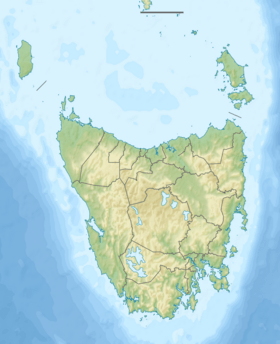Serpentine Dam (Tasmania) facts for kids
Quick facts for kids Serpentine Dam |
|
|---|---|
|
Location of the Serpentine Dam in Tasmania
|
|
| Country | Australia |
| Location | South West Tasmania |
| Coordinates | 42°46′35″S 145°58′56″E / 42.77639°S 145.98222°E |
| Purpose | Power |
| Status | Operational |
| Opening date | 1971 |
| Owner(s) | Hydro Tasmania |
| Dam and spillways | |
| Type of dam | Embankment dam |
| Impounds | Serpentine River |
| Height | 38 metres (125 ft) |
| Length | 134 metres (440 ft) |
| Dam volume | 127×103 m3 (4.5×106 cu ft) |
| Spillways | 1 |
| Spillway type | Controlled |
| Spillway capacity | 242 m3/s (8,500 cu ft/s) |
| Reservoir | |
| Creates | Lake Pedder |
| Total capacity | 2,937,930 ML (103,752×106 cu ft) |
| Catchment area | 734 km2 (283 sq mi) |
| Surface area | 242 km2 (93 sq mi) |
| Maximum water depth | 43 m (141 ft) |
The Serpentine Dam is a large wall built across the Serpentine River in Tasmania, Australia. It is made mostly of rock and has a concrete front. This dam helps to hold back water, creating a big lake called Lake Pedder.
The Serpentine Dam was built in 1971 by Hydro Tasmania. It is part of a bigger plan called the Gordon River Power Development Scheme. The main goal was to create hydro-electric power. This means using the force of water to make electricity. Water from Lake Pedder flows into another lake, Lake Gordon, through a channel called the McPartlan Pass Canal. From Lake Gordon, the water then goes to the Gordon Power Station to make power.
Contents
What is the Serpentine Dam?
The Serpentine Dam is one of three main dams that create the large Lake Pedder. The other two are the Edgar Dam and the Scotts Peak Dam. These dams are important for the Gordon River Power Scheme. The Serpentine Dam is located where the Serpentine River flows down from the Frankland Range.
How the Dam Works with Lake Pedder
Lake Pedder was formed by these three dams. Before the dams, there was a smaller, natural lake called Lake Edgar. The new, much larger Lake Pedder now covers that area. The water in Lake Pedder is very important. It provides about 40% of the water used to make electricity at the Gordon Power Station.
The water travels from Lake Pedder through the McPartlan Canal to Lake Gordon. From Lake Gordon, the water then flows through the Gordon Power Station. After making electricity, the water is released into the Gordon River.
Building the Serpentine Dam
The Serpentine Dam wall is built on a base of rock and soil. It is 38 metres (125 feet) high and 134 metres (440 feet) long. The dam holds back a huge amount of water. When Lake Pedder is full, the dam holds about 2,937,930 megalitres of water. A megalitre is a million litres!
The surface of Lake Pedder covers about 242 square kilometres (93 square miles). The area that collects water for the lake is about 734 square kilometres (283 square miles). The dam also has a special part called a controlled spillway. This spillway can release water safely if the lake gets too full. It can let out about 242 cubic metres (8,546 cubic feet) of water every second.
Impact on Nature
Building the Serpentine Dam had an effect on the local environment. It caused the loss of some plants that lived only in that area. One example is a rare plant called Centrolepis pedderensis.
Before the dam, some of these plants grew along the Serpentine River. When the dam was built and Lake Pedder filled up, these plants were covered by water. Now, this plant is only known to exist in one other place, on the Frankland Range.
 | Emma Amos |
 | Edward Mitchell Bannister |
 | Larry D. Alexander |
 | Ernie Barnes |


